As public education enters a new era marked by volatility, complexity, and opportunity, the Education Research and Development Institute (ERDI) has released its Winter 2025 National Insight Report, offering a grounded and urgent view into the most pressing issues in PK–12 education. Drawing on survey data and rich dialogue from more than 100 district leaders, the report synthesizes real-time challenges and forward-thinking strategies into five essential insights that illuminate both the current moment and the road ahead.
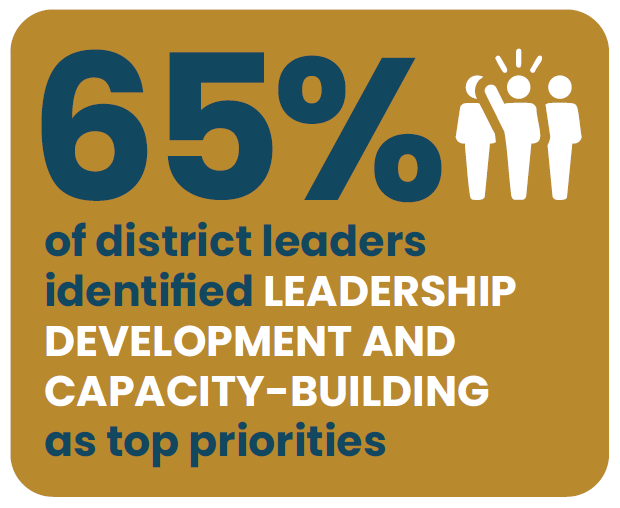
1. The Leadership Crisis in PK–12 Education
Superintendent turnover has reached historic highs, and the leadership pipeline is shrinking. More than 65% of district leaders identified leadership development and capacity-building as top priorities. The pressures of political polarization, heightened community expectations, and the evolving role of superintendents have created instability that threatens systemic progress.
Call to Action: Invest in mentorship, professional development, and policy protections that support superintendent longevity and leadership sustainability. Peer networks and collaborative leadership models offer scalable solutions to this systemic concern.
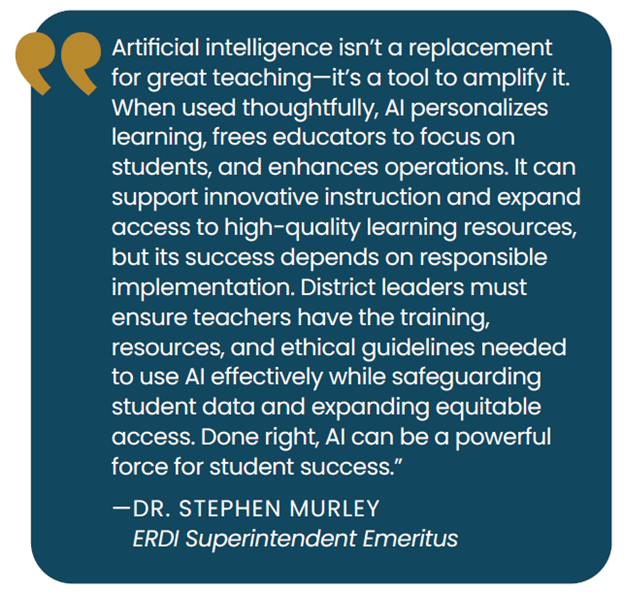
2. Artificial Intelligence: Promise and Complexity
AI is no longer speculative, it is reshaping instruction, operations, and decision-making in school systems. While 64% of leaders see AI as a dual opportunity and challenge, concerns remain around educator readiness, student data privacy, and equitable access to technology.
Call to Action: Develop district-wide implementation frameworks grounded in ethics, equity, and pedagogy. Robust training and infrastructure investments are essential to ensure AI enhances rather than replaces human connection in classrooms.
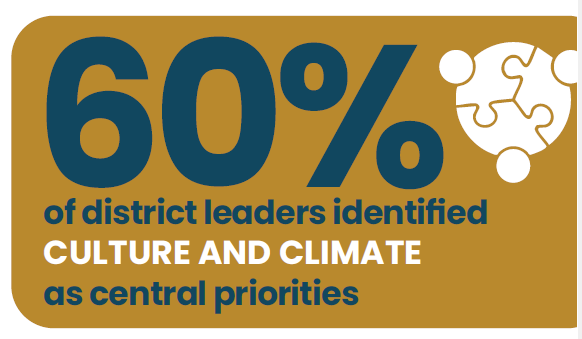
3. Student and Staff Well-Being: A Fragile Foundation
Sixty percent of leaders identified school culture and climate as urgent areas of concern, and 42% cited mental health, safety, and well-being as critical focus areas. Chronic absenteeism, student disengagement, and educator burnout are deeply interconnected and exacerbated by ongoing societal and economic pressures.
Call to Action: Reimagine wellness systems to include trauma-informed practices, dedicated support infrastructure, and relationship-centered strategies. Prioritize initiatives that foster belonging, reduce staff burnout, and measure climate as a core success metric.
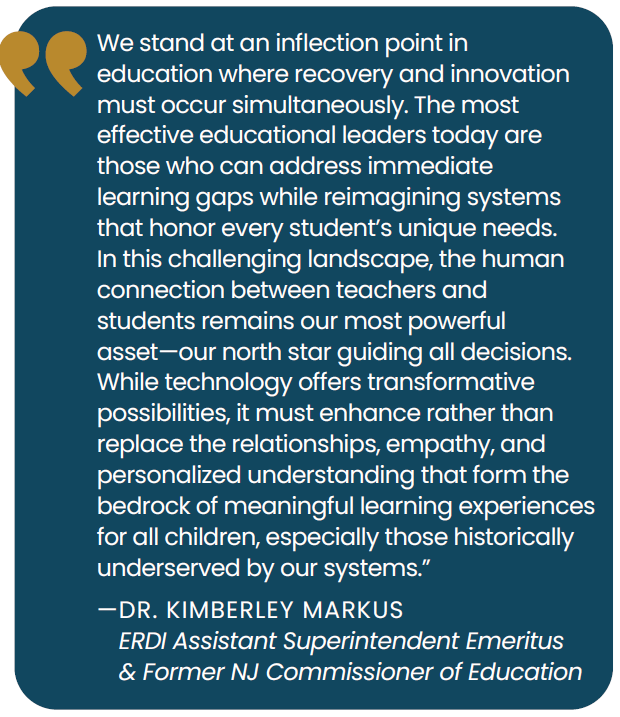
4. The Changing Face of Teaching and Learning
The post-pandemic period has magnified inequities while creating opportunities for innovation. Nearly half of all district leaders named effective instruction and closing opportunity gaps as top concerns. New instructional models, such as the science of reading, competency-based learning, and personalized pathways, are gaining traction—but they must be grounded in equity and engagement.
Call to Action: Build comprehensive recovery and equity strategies, strengthen MTSS systems, and integrate meaningful student engagement approaches. Leaders must balance immediate learning recovery with long-term transformation, especially for historically underserved students.
5. Resource Constraints and Sustainability
District leaders are navigating intense operational pressures, from cybersecurity threats (41%) to infrastructure needs, all while ensuring fiscal responsibility and maximizing limited resources. Half of those surveyed cited the safety and well-being of school communities as strategic imperatives.
Call to Action: Move beyond reactive measures toward systems that are secure, student-centered, and financially resilient. Develop multi-year financial roadmaps, flexible learning environments, and collaborative crisis response networks that blend operational strength with human-centered design.
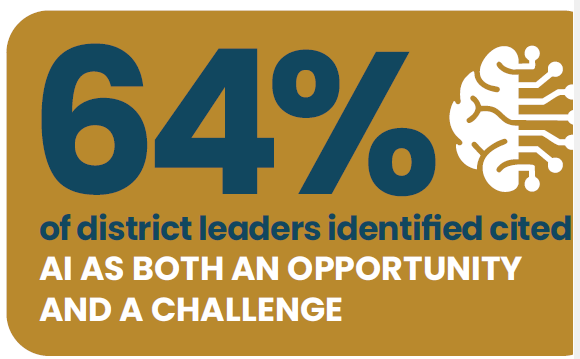
Opportunities for Systemic Collaboration
Recognizing that no district can tackle these challenges in isolation, the report outlines powerful frameworks for collective action:
- Leadership Development Networks: Cross-sector collaboration to cultivate and sustain superintendents.
- Integrated Well-Being Frameworks: School-community alliances to deliver holistic care.
- Collective AI Governance: Shared implementation models and ethical standards across districts.
- Equity-Centered Coalitions: Community-led efforts to eliminate achievement gaps.
- Reimagined Resource Allocation Systems: Dynamic, data-informed funding strategies.
- Security and Well-Being Integration: Safety rooted in trust, relationships, and responsive systems.
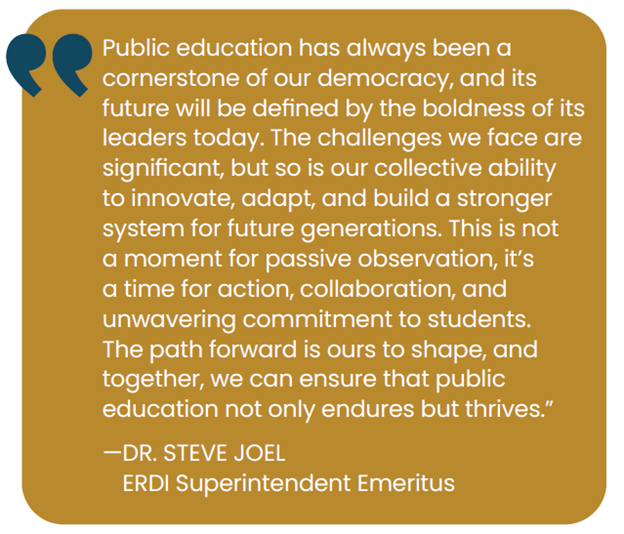
Why It Matters
At its core, the ERDI Winter 2025 Report amplifies the voices of those on the frontlines,superintendents and senior leaders, who are navigating today’s complexities with vision and resolve. By lifting up their insights, ERDI continues to serve as a bridge between educators and solution providers, helping to co-create tools, partnerships, and practices that meet the moment.
As Dr. Steve Joel, ERDI Superintendent Emeritus, writes in the report’s closing reflection, “This is not a moment for passive observation. It’s a time for action, collaboration, and unwavering commitment to students.”
The time to act is now.
To read the full report: https://www.erdius.org/news-resources

